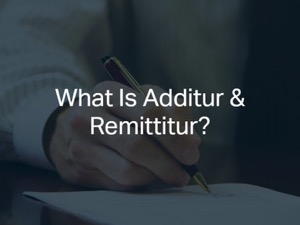
At the end of a personal injury lawsuit in West Virginia, a jury will return a verdict either awarding a judgment to the victim or naming the defendant not liable. If the victim wins the case, the jury will award a certain amount of money in damages to make the victim whole again.
Both the victim (plaintiff) and the defendant can appeal the jury’s decision. If this occurs, the claim may involve the additur or remittitur legal process.

Additur is a legal term that refers to appealing the damage award granted and receiving a higher amount from the defendant as an addition to the award already assigned. Additur represents the power a trial court has to increase the amount of the judgment award assigned by a jury.
Additur is a relatively uncommon legal action used when a jury’s damage award is s insufficient to compensate the victim for his or her substantial damages.
Additur during a personal injury case is something that may be available if the amount awarded is grossly inadequate and constitutes a miscarriage of justice, or if it appears the amount awarded was the result of the jury being influenced by prejudice, corruption, or mistake.
In these scenarios, an attorney can file a request for a new trial. Instead of granting this motion, a trial judge may grant an additur to rectify the situation.
The defendant’s attorney will weigh the pros and cons of a new trial vs. giving the plaintiff more money in an additur. If the defendant consents to the additur, the plaintiff will receive more money in exchange for the plaintiff giving up all further rights to sue. Accepting additur automatically takes away the option of a new trial.
The plaintiff will not have to grant permission for additur, as he or she will be the one receiving more money.
Remittitur is the exact opposite of additur. It is the removal of a portion of a judgment award granted by a jury. Remittitur may occur if a judge believes the verdict awarded is grossly excessive for the circumstances. Receiving remittitur involves the same legal processes as additur in West Virginia.
If an attorney or a judge believes the judgment award granted to a plaintiff is excessive or comes as a result of mistake or corruption on the jury’s part, he or she can file a motion for remittitur. A different trial judge will then review the case and make a decision – either pass the motion for remittitur or assign a court date for a new trial.
A plaintiff in West Virginia must comply with a remittitur command. It will not matter whether or not the plaintiff wants to forfeit a portion of his or her judgment award. What the judge says, goes.
Typically, an excessively large judgment award is not in itself a reason for a judge to command remittitur. Punitive damages awarded is also not a valid reason alone for remittitur. Granting remittitur will only occur if a judge believes the amount awarded a plaintiff is so grossly excessive for the victim’s damages that it constitutes a miscarriage of justice.
Additur and remittitur ensure the justness of a judgment award while conserving valuable court resources. Rather than starting a case over with a new trial, additur and remittitur allow the courts to rectify an excessively high or low jury verdict while saving time and money. These processes avoid increased costs to both parties while still protecting a plaintiff’s or defendant’s rights to a fair judgment. For more information about additur and remittitur, contact a personal injury lawyer in West Virginia.
Additur and remittitur are legal processes used in personal injury lawsuits to adjust the amount of damages awarded by a jury. Additur increases the award if it’s insufficient, while remittitur decreases it if deemed excessively high.
Additur is employed when a jury’s damage award is insufficient to cover the victim’s substantial damages, especially if the award seems influenced by prejudice, corruption, or mistakes.
The plaintiff doesn’t need to grant permission for additur as it benefits them. Accepting additur involves relinquishing the right to sue further and excludes the option of a new trial.
Remittitur occurs if the judge finds the jury’s award grossly excessive, not aligned with the actual damages, or if there’s evidence of jury error or corruption.
In West Virginia, a plaintiff must comply with a remittitur command, regardless of their willingness to forfeit a portion of the judgment award.
These processes prevent the need for a new trial, saving time and resources for both the court and the parties involved, while ensuring just compensation is awarded.
Both the plaintiff and defendant have the right to appeal the decision of additur or remittitur, though this might lead to a new trial or different legal proceedings.
While punitive damages alone aren’t typically a reason for remittitur, they may be considered if the overall award is found to be grossly excessive.
It’s advisable to consult with a personal injury lawyer in West Virginia for guidance and to understand your rights and options in the case of additur or remittitur.
While commonly used in personal injury cases, the applicability of additur and remittitur can vary depending on the type of lawsuit and jurisdiction.

Attorney Timothy Manchin established the Manchin Injury Law Group in 2011 after his law partner of more than 25 years became a West Virginia circuit court judge. His focus is on helping individual clients and entire families victimized by negligent acts.
We offer a free initial consultation at our office in the Manchin Professional Building — our home since 1983 — conveniently located in Fairmont.
If you are unable to visit our firm, we can come to your home or hospital room.
Fill out the form below to get in touch!